
Radar detectors for different driving habits
Key Takeaways
- Understanding your driving style is essential for choosing the right radar detector.
- Entry-level detectors suit casual and occasional drivers.
- Advanced models provide more features for frequent highway drivers.
- Local traffic environments can require specialized detectors.
- Investing in reliable accessories can improve performance.
Choosing the right radar detector can significantly enhance your driving experience, especially considering your specific driving habits. Whether you're a frequent highway traveler, a city driver, or someone who enjoys the open rural roads, the radar detector you choose can play a critical role in how well you stay aware of your surroundings. This guide will help you identify which type of radar detector is best suited for your driving style, ensuring you make an informed choice.
Understanding different driving habits
Your driving habits can be categorized into various styles, and understanding these can help in selecting the right radar detector. Here are some common driving habits:
| Driving Habit | Description |
|---|---|
| Highway Driving | Long stretches of the highway where speeding is common. |
| City Driving | Frequent stops and starts with more traffic lights. |
| Rural Driving | Less traffic but higher speed limits in open areas. |
| Mixed Driving | Combination of highway, city, and rural driving. |
Choosing the right radar detector based on driving habits
Here’s how to choose the right radar detector based on the driving habits mentioned above:
1. Highway driving
- Look for detectors that have a long detection range.
- Consider models with multi-band capabilities to catch different radar signals.
- GPS functionality can help you avoid false alerts by remembering common stationary radar locations.
2. City driving
- A model with strong filtering capabilities is essential to minimize false alerts.
- Look for a detector that can recognize different signals accurately and quickly.
- Consider handheld devices or those that can be easily mounted and removed.
3. Rural driving
- Select a detector that works efficiently at higher speeds.
- Features like GPS locks to remember frequent patrol spots are useful.
- Opt for a model with a long battery life to handle longer drives without interruption.
4. Mixed driving
- A versatile detector that can adapt to various environments is ideal.
- Consider features like voice alerts for hands-free monitoring.
- GPS-enabled detectors reduce false alerts in both urban and rural settings.
Important features to consider
When selecting a radar detector, pay close attention to the following features:
| Feature | Benefits |
|---|---|
| Range | The distance from which the radar detector can pick up signals, crucial for highway driving. |
| GPS Technology | Alerts you of known speed traps and red-light cameras, lowers false alerts in city driving. |
| False Alert Filtering | Reduces unnecessary distractions, especially in urban areas. |
| Ease of Use | Simple installation and operation make it better suited for any driver. |
Radar detector accessories
Enhancing your radar detector experience often involves investing in quality accessories:
- Hardwire Kits: For constant power without the need for batteries.
- Windshield Mounts: To ensure better positioning and reduce distractions.
- Car Battery Alert: To notify when your car battery is running low.
Where to find radar detectors
For a range of products tailored to different needs, check out our product categories:
- Advanced Radar Detectors
- Entry-Level Radar Detectors
- GPS Navigation Devices
- Police Scanners & CB Radios
- Radar Detector Accessories
Conclusion
Choosing the right radar detector based on your driving habits is crucial for safety and efficiency. With the information provided in this guide, you can navigate through various options tailored to your specific needs. Understanding your driving environment can significantly enhance the overall driving experience. Start your journey with the right radar detector and drive with confidence!
Pros
- Increased awareness of speed limits and road conditions.
- Ability to avoid costly speeding fines.
- Better decision-making during driving based on alerts.
Cons
- Potential for false alerts, especially in crowded areas.
- May require regular updates for optimal performance.
- Initial cost can be a barrier for some drivers.
Tips for beginners
- Start with an entry-level model to understand features.
- Read reviews and comparisons before making a purchase.
- Regularly update your device for the best performance.
